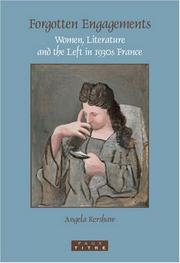| Listing 1 - 2 of 2 |
Sort by
|
Book
ISBN: 9782916914992 2916914994 Year: 2022 Publisher: Paris : MAD : École du Louvre, Palais du Louvre,
Abstract | Keywords | Export | Availability | Bookmark
 Loading...
Loading...Choose an application
- Reference Manager
- EndNote
- RefWorks (Direct export to RefWorks)
"Alors qu'elle se pose rarement pour les hommes politiques, la question du vêtement est incontournable pour les femmes : quelle tenue choisir pour quelle circonstance dans une garde-robe bien plus étendue que celle de leurs confrères ? S'habiller correctement, c'est, de nos jours, montrer sa connaissance des codes sociaux et signifier que l'on honore ses prescriptions. En France, des années 1930 à aujourd'hui, du tailleur-jupe au mouvement #MeToo, cette enquête historique rigoureuse, basée sur des articles de presse, des photographies et des entretiens avec des personnalités comme Édith Cresson, Michèle Alliot-Marie, Roselyne Bachelot, Nathalie Kosciusko-Morizet ou Najat Vallaud-Belkacem, apporte un éclairage précieux sur la façon dont les femmes politiques vivent le rapport au vêtement et, plus largement, à leur apparence."
Women's clothing - France - History - 20th century --- Women's clothing - France - History - 21st century --- Women - Political activity - France - History - 20th century --- Women - Political activity - France - History - 21st century --- Fashion - Political aspects - France - History - 20th century --- Fashion - Political aspects - France - History - 21st century --- Women's clothing --- Women --- Fashion --- Femmes politiques --- Vêtements de femme --- Vêtements --- Mode --- Aspect politique

ISBN: 9789042021693 9042021691 940120411X 1429481137 9781429481137 9789401204118 Year: 2007 Volume: 291 Publisher: Amsterdam: Rodopi,
Abstract | Keywords | Export | Availability | Bookmark
 Loading...
Loading...Choose an application
- Reference Manager
- EndNote
- RefWorks (Direct export to RefWorks)
This study is the first to examine the contribution made by women writers to politically committed literature in 1930's France. Its purpose is to bring to light the work of female authors of left-wing fiction whose novels are comparable to those of well-known male practitioners of littérature engagée , such as Paul Nizan and Louis Aragon. It analyses the work of Madeleine Pelletier, Simone Téry, Edith Thomas, Henriette Valet and Louise Weiss in the context of the inter-war models of committed literature in relation to which they were produced. Consideration of this body of fictional texts, not previously brought together by literary historians, shows how women were able to relate to fiction and to politics in inter-war France. Situating the novels within their social, historical, literary and political environment, the book contributes to the literary and cultural history of twentieth century France. The analysis of inter-war political writing by women calls into question the criteria against which women’s writing has been evaluated by feminist scholarship.
Women --- Women authors, French --- History --- History and criticism --- Political activity --- Fiction --- Thematology --- French literature --- anno 1930-1939 --- Women in public life --- Politics and culture --- Femmes --- Ecrivaines françaises --- Femmes dans la vie publique --- Politique et culture --- Histoire --- 20e siècle --- Activité politique --- France --- anno 1920-1929 --- Human females --- Wimmin --- Woman --- Womon --- Womyn --- Females --- Human beings --- Femininity --- French women authors --- History and criticism. --- Women - France - History - 20th century --- Women authors, French - 20th century - History and criticism --- Women - Political activity - France - History - 20th century --- Gender --- Interbellum --- Literature --- Politics --- Sexuality --- Writers --- Female body --- Book
| Listing 1 - 2 of 2 |
Sort by
|

 Search
Search Feedback
Feedback About UniCat
About UniCat  Help
Help News
News